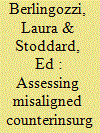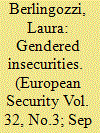| Srl | Item |
| 1 |
ID:
178523


|
|
|
|
|
| Summary/Abstract |
While representing a major military threat in Niger and Nigeria, the two branches of the Islamic State West Africa Province (ISWAP-Liptako Gourma and ISWAP-Lake Chad) have increasingly sought to win popular support (distinguishing themselves from other groups in the region, especially Boko Haram). Yet, despite some improvements in the recent past, both Niger’s and Nigeria’s different counterinsurgency practices have not been sufficiently adapted to (and therefore remain strategically misaligned vis-à-vis) ISWAP’s more population-centric approach. Strategic rethinking and realignment of the still predominantly enemy-centric approaches of both states are essential so that ISWAP strategy can be countered in the long term.
|
|
|
|
|
|
|
|
|
|
|
|
|
|
|
|
| 2 |
ID:
193147


|
|
|
|
|
| Summary/Abstract |
What kind and whose security is the European Union concerned with in its gender practices in countering violent extremism? This article contributes to the scholarship on EU implementation of the Women, Peace and Security agenda and gender in countering violent extremism, highlighting shortcomings in the conceptualisation and practice of women’s participation in the security sphere. Taking Niger as a heuristic case study, the paper explores tensions between local gender norms and EU securitised framing of women’s empowerment and gender equality, arguing that women’s increased participation in the security field is tacitly understood in terms of use-value. Building on feminist postcolonial scholarship, the analysis uncovers how women are included and what expectations they are deriving from their engagement, exposing the neoliberal and neocolonial framings of EU intervention and the misunderstandings of women’s materialities. By ontologically flattening women subjectivities without accounting for their intersectional experiences, both patriarchy and global hierarchies of knowledge production are reiterated. In doing so, the EU co-constructs gendered and racialised subjects, thus reinforcing inequalities, silencing local pluralities, and in many cases, aggravating women’s situation of insecurity in Niger. The analysis employs feminist and ethnographic methods, including semi-structured interviews and participant observation.
|
|
|
|
|
|
|
|
|
|
|
|
|
|
|
|